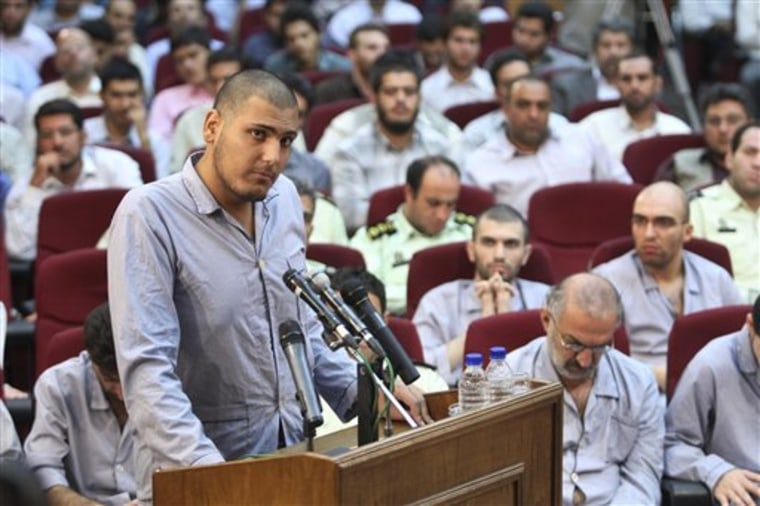Iran on Sunday put on trial 25 more activists and opposition supporters, including a Jewish teenager, for their alleged involvement in the turmoil following the recent presidential election.
Iranian President Mahmoud Ahmadinejad has attempted to paint those who took to the streets after the June election to protest his disputed victory as agents of foreign enemies seeking to topple the country's Islamic system.
The president pushed ahead with preparations for his next term Sunday by announcing that he will nominate three women to join his new Cabinet, a move that could produce the first female ministers in the country since the 1979 Islamic Revolution.
The announcement appears to be an attempt by Ahmadinejad to enlist the support of Iranian women as he fends off criticism from the opposition that his re-election was fraudulent. The appointments seem unlikely to appease reformists, however, since both women he named Sunday are fellow hardliners.
The prosecutor opened Sunday's trial with a general indictment of all 25 defendants, accusing them of plotting the post-election turmoil years ahead of time, said the state news agency.
During the trial, authorities played a film showing attacks on public property, cars and a mosque by protesters.
U.S. accused of fueling unrest
Earlier this month Iran held two other court sessions for more than 100 reformist politicians and activists accused of attempting to overthrow Iran's Islamic system during massive protests that erupted after the June 12 vote. The opposition has called the trial a sham.
Ahmadinejad has repeatedly accused the U.S. of fueling the post-election unrest despite President Barack Obama's denial and his attempts to step up diplomatic engagement with Iran to defuse tension over the country's controversial nuclear program.
The Iranian president indirectly criticized Obama while speaking to a group of clerics Sunday, saying "the excellency who talks about change made a big mistake when he openly interfered in Iran's domestic issues," according to the semi-official Mehr news agency.
One of the people who went on trial Sunday belongs to Iran's tiny Jewish community.
Yaghoghil Shaolian, 19, was quoted by Fars news agency as saying he wasn't an activist and didn't even vote, but just got carried away and threw some stones at a bank branch in central Tehran, resulting in his arrest.
Iran's sole Jewish parliamentarian, Siamak Mereh Sedq, confirmed the detention of Shaolian and his Jewish identity to The Associated Press. He said Shaolian's detention was not related to his religion.
"He is innocent. We hope to see his release soon based on Islamic mercy," he said.
Shaolian's trial is the first time a Jew has been tried in Iran since 2000 when 13 Jews were charged with spying for Israel. Iran is home to 25,000 Jews, the largest such community in the Middle East outside Israel.
Parliament must approve ministers
Ahmadinejad's new judiciary chief, Sadeq Larijani, will take responsibility for the controversial trials after his inauguration Monday.
The president named two women on state television Sunday who he said he would appoint to his Cabinet: Marzieh Vahid Dastgerdi, a 50-year-old gynecologist, as health minister and Fatemeh Ajorlu, a 43-year-old lawmaker, as minister of welfare and social security
He did not name the third woman but said he will nominate at least one more female minister to the Cabinet. Ahmadinejad currently has a female vice president on his Cabinet who is in charge of the environment.
Iran's last female minister, Farrokhroo Parsay, served from 1968 to 1977. She was executed on charges of corruption after the 1979 Islamic Revolution that brought hard-line Islamists to power.
Every minister has to be approved by parliament — an uncertain prospect since some lawmakers have criticized Ahmadinejad for not consulting with them prior to making his nominations.
Ahmadinejad also named cleric Haidar Moslehi as the new intelligence minister Sunday. Moslehi currently serves has the head of the department of endowment and charity affairs. The president said the names of all 21 ministers and 12 vice presidents on the Cabinet will be announced Wednesday.
Mousavi to form new organization
Newspapers on Sunday reported that opposition leader Mir Hossein Mousavi, who claims he won the June election, will form a new political organization to pursue freedoms within the framework of the country's constitution.
Mousavi named the body "the Green Path of Hope" and said it was aimed at regaining people's constitutional rights.
He said volunteer and social networks would form the body of his organization without further elaborating.
The move comes as pressure mounts on Mousavi and his allies by hardliners, who have been calling for him to be tried as well.
During Sunday's trial, one of the defendants, Mehrdad Aslani accused Mousavi of planting the idea of election fraud in the mind of their supporters.
"Mr. Mousavi, do you know there are seats here for you and your friends who were the cause of this plot?" he said. There have been no official indictments against Mousavi.
More on: Iran
